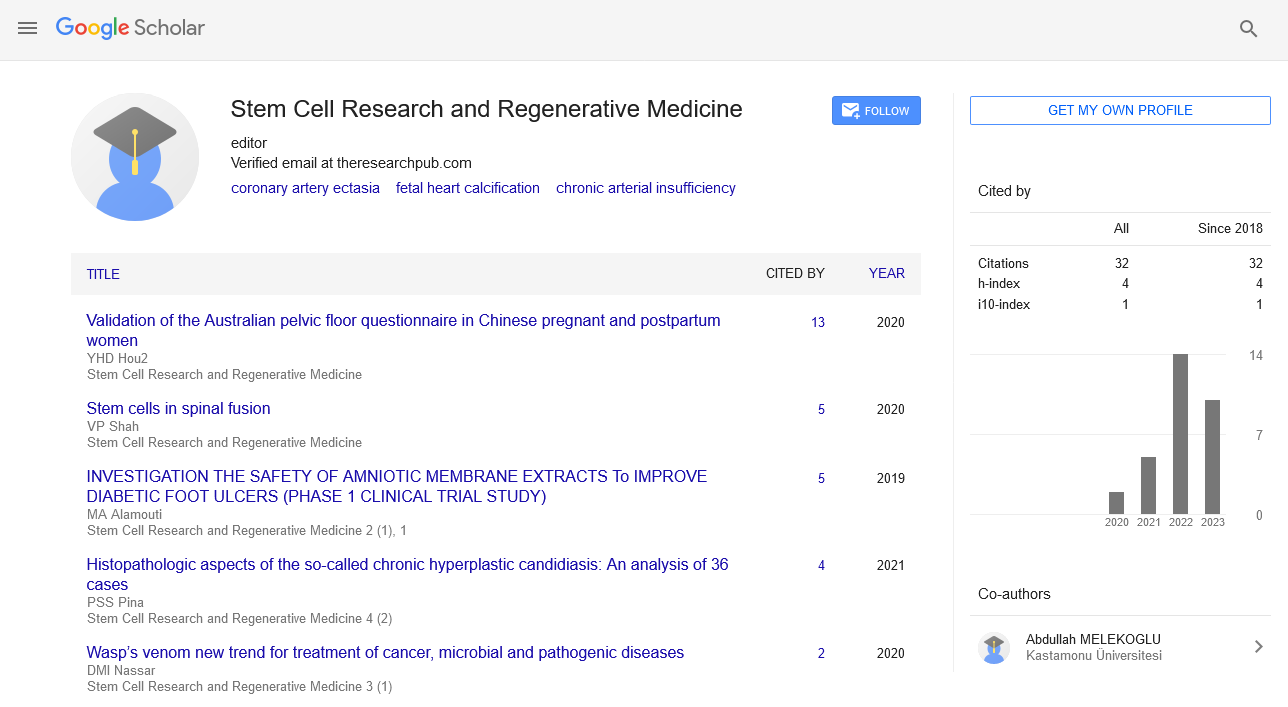Perspective - Stem Cell Research and Regenerative Medicine (2024) Volume 7, Issue 2
Unraveling Anorexia Nervosa: A Comprehensive Exploration of Eating Disorder Dynamics
- Corresponding Author:
- Lorenzo Moroni
Department of Psychiatry and Behavioral Sciences,
Sungkyunkwan University,
Suwon,
South Korea
E-mail: lorenmoroni@gmail.com
Received: 19-Mar-2024, Manuscript No. SRRM-24-130057; Editor assigned: 21-Mar-2024, Pre QC No. SRRM-24-130057 (PQ); Reviewed: 03-Apr-2024, QC No. SRRM-24- 130057; Revised: 12-Apr-2024, Manuscript No. SRRM-24-130057 (R); Published: 18-Apr-2024, DOI: 10.37532/SRRM.2024.7(2).187-188
Introduction
Anorexia nervosa is a complex and potentially life-threatening eating disorder characterized by an intense fear of gaining weight, distorted body image, and restrictive eating behaviours. Individuals with anorexia nervosa often perceive themselves as overweight, despite being underweight, and engage in extreme efforts t o control t heir weight a nd s hape. This di sorder not only affects physical health but also has profound psychological and social implications. Understanding the multifaceted nature of anorexia nervosa is essential for effective diagnosis, treatment, and prevention efforts.
Description
Anorexia nervosa typically emerges during adolescence or young adulthood, although it can occur at any age. While the exact cause of anorexia nervosa remains unclear, it is believed to result from a combination of genetic, biological, environmental, and psychological factors. Genetic predisposition plays a significant role, with individuals having a family history of eating disorders being at higher risk. Biological factors such as neurotransmitter imbalances, hormonal abnormalities, and abnormalities in brain structure and function may also contribute to the development of anorexia nervosa.
Environmental influences, including societal pressure to attain a certain body size and shape, media portrayals of thinness as ideal and interpersonal relationships, can significantly impact the risk of developing anorexia nervosa. Psychological factors such as low self-esteem, perfectionism, anxiety, and trauma may also contribute to the onset and maintenance of the disorder. Additionally, dieting and weight loss behaviours, often initiated for health or aesthetic reasons, can escalate into pathological eating patterns characteristic of anorexia nervosa.
The diagnostic criteria for anorexia nervosa, as outlined in the Diagnostic and Statistical Manual of Mental Disorders (DSM-5), include restriction of energy intake relative to requirements leading to significantly low body weight, intense fear of gaining weight or becoming fat, and disturbance in the way one’s body weight or shape is experienced, undue influence of body weight or shape on self-evaluation, or denial of the seriousness of the current low body weight.
The physical consequences of anorexia nervosa can be severe and potentially life-threatening. Prolonged malnutrition can lead to a range of medical complications, including cardiovascular problems such as bradycardia, hypotension, and arrhythmias; gastrointestinal disturbances such as constipation, bloating, and gastroparesis; endocrine abnormalities such as amenorrhea, hypothyroidism, and electrolyte imbalances; and skeletal issues such as osteoporosis and fractures.
In addition to the physical effects, anorexia nervosa can have profound psychological and social consequences. Individuals with anorexia nervosa often experience significant distress, anxiety, and depression related to their eating behaviors and body image. Social withdrawal, isolation, and difficulties in interpersonal relationships are common, as the disorder can consume a person’s thoughts and behaviors, leaving little room for other activities and interests. Moreover, anorexia nervosa can impair cognitive function, including concentration, memory, and decision-making, further complicating treatment and recovery efforts.
Treatment for anorexia nervosa typically involves a multidisciplinary approach addressing medical, nutritional, and psychological aspects of the disorder. Medical management aims to stabilize physical health, correct nutritional deficiencies, and monitor for complications associated with malnutrition. Nutritional rehabilitation, often overseen by registered dietitians, focuses on restoring healthy eating patterns and achieving appropriate weight restoration. Psychotherapy, including Cognitive-Behavioral Therapy (CBT), Interpersonal Therapy (IPT), and Family-Based Therapy (FBT), is essential for addressing the underlying psychological factors contributing to anorexia nervosa and promoting long-term recovery.
In some cases, psychiatric medications such as Selective Serotonin Reuptake Inhibitors (SSRIs) or atypical antipsychotics may be prescribed to target co-occurring mood or anxiety disorders. Hospitalization may be necessary for individuals with severe malnutrition, medical instability, or imminent risk of self-harm or suicide. Ongoing monitoring and support are crucial during the recovery process, as anorexia nervosa can be characterized by relapses and fluctuations in Preventing anorexia nervosa requires a comprehensive approach targeting risk factors at individual, family, community, and societal levels. Promoting positive body image, challenging unrealistic beauty ideals, fostering healthy attitudes toward food and exercise, and providing education about the dangers of extreme dieting and disordered eating behaviors are essential components of prevention efforts. Early detection and intervention are critical, as prompt treatment can improve outcomes and reduce the risk of long-term complications associated with anorexia nervosa.
Conclusion
Anorexia nervosa is a complex and potentially life-threatening eating disorder characterized by distorted body image, intense fear of gaining weight, and restrictive eating behaviors. It affects individuals physically, psychologically, and socially, and requires a multidisciplinary approach to treatment and prevention. By understanding the factors contributing to the development of anorexia nervosa and implementing comprehensive strategies to address them, it is possible to support recovery and promote long-term health and well-being for individuals affected by this disorder.


